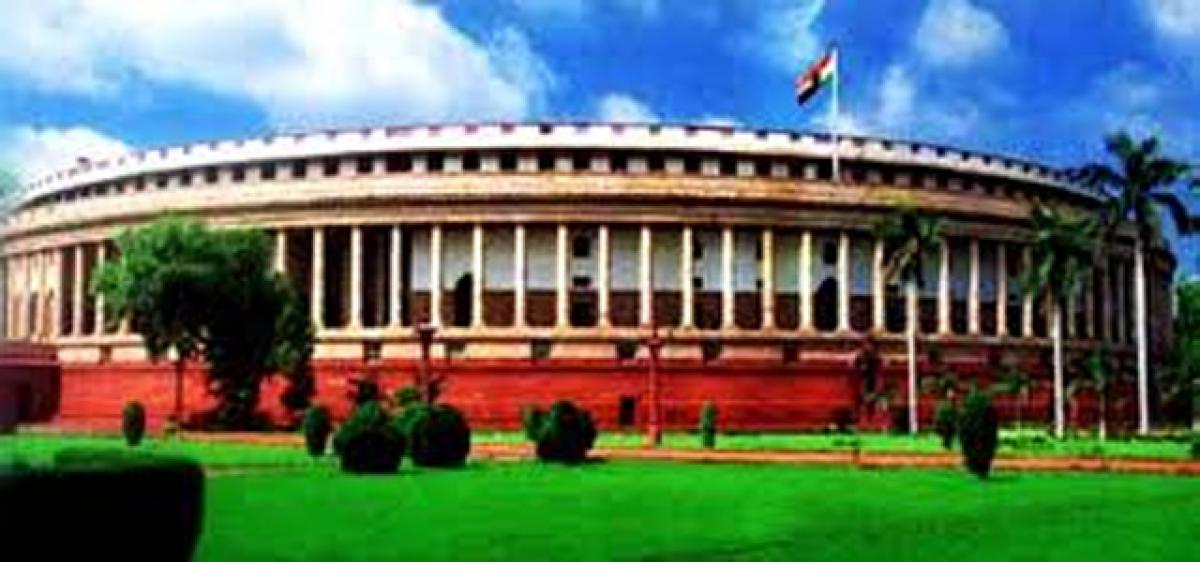Live
- Governor Jishnu Dev Varma Visits Udyan Utsav-2025 at Rashtrapati Nilayam
- Telangana CM Revanth Reddy Urges PM Modi to Approve Pending Railway Projects
- Rahul, Priyanka Gandhi mourn martyrdom of security personnel in Bijapur Maoist attack
- Lucknow airport records robust growth as flyers’ headcount surges past 5.21 million in April-December
- Tributes Pour in for BA Raju on His 65th Birth Anniversary
- Japan's Nippon Steel, US Steel file lawsuit against US government
- Hyderabad's Cherlapalli Railway Terminal Inaugurated: Key Development in City's Transport Infrastructure
- Congress Government Takes Pride in Hyderabad’s Development: CM Revanth Reddy
- Glad to know about Microsoft's ambitious expansion, investment plans in India: PM Modi
- World Test Championship 2025: How Australia Could Still Miss Out on WTC Final Spot
Just In

Marking a step up for democracy, the Parliament may soon rope in bright young scholars who would get an opportunity to work with the standing committees.
Marking a step up for democracy, the Parliament may soon rope in bright young scholars who would get an opportunity to work with the standing committees.
Taking a leaf from the United States, Canada and the United Kingdom, where students and research scholars get to work with Parliamentary panels, Lok Sabha Speaker Sumitra Mahajan is pushing for induction of interns in the Parliamentary standing committees.
She held a meeting on January 31 with around 16 of the 24 panel heads who supported the idea, but were wary about maintaining secrecy of the proceedings or of the documents available with the panel.
"It is a good idea, but secrecy is a concern," said a panel chairman, who did not wish to be named.
Sources said a way out could be that these interns are attached to the offices of the panel chairpersons, who may ask them to prepare background reports on specific topics, while keeping them away from the proceedings.
The whole idea, said sources, is to make private sector talent available to the Parliamentary system and give exposure of Parliamentary democracy to the students.
The subject-specific panels are critical to the smooth functioning of Parliament and act like a mini-House comprising members from various political parties.
Since they meet in camera, the panel meetings are hardly disrupted by the members and are considered to be more efficient than the main Houses Lok Sabha and Rajya Sabha, where partisan politics often weighs over national interest.
Besides producing insightful reports on issues mutually identified between the treasury and the opposition lawmakers, reviewing key bills, the standing committees examine the annual budgets of various ministries, a process which contributes to the faster approval of the Finance Bill.
Usually, budget proposal are presented in the Lok Sabha in the first half of the Budget Session and the Finance Bill is debated and passed in the second half.
The standing committees become active during the month-long recess thus saving crucial time for the main Houses.
The interesting part is that these panels function even when the parliament remains disrupted.
The role of interns is not entirely new to Parliament as the Bureau of Parliamentary Studies and Training (BPST) has a provision for select a few scholars to get an exposure of how Parliament system works.
But this is the first time that the Parliament is considering involving private scholars with the standing committees.
Some lawmakers do hire the services of interns, who work in their offices, but this is not a norm with most Parliamentarians.
PRS Legislative Research, which tracks Parliament's functioning, also hosts a programme where select students get to work with the lawmakers for a limited period.
Recently, the Ministry of External Affairs too has started a programme to rope in private domain experts to help the South Block mandarins effectively achieve India's foreign policy objectives.
At present there are 24 subject-related standing committees like finance, external affairs, defence, home affairs, commerce, law and justice, HRD etc
In Canada, the parliamentarians (Members of the House of Commons only) benefit from the assistantship of bright, articulate and dynamic fresh university or law school graduates who are culled out through a merit-based and highly competitive selection process and placed in their chambers via the Parliamentary Internship Programme (PIP).
The brainchild of Alfred Hales, a Member of Parliament who represented the Wellington Constituency from 1957 to 1974, PIP has been successfully administered by the Canadian Political Science Association since 1969.

© 2024 Hyderabad Media House Limited/The Hans India. All rights reserved. Powered by hocalwire.com







